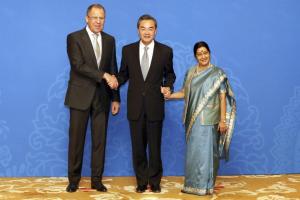The Russia-India-China (RIC) meet of its foreign ministers in Moscow is unlikely to have thawed the freeze between two Asian giants, China and India.
The same is true of the simultaneous visit of India’s defence minister Manohar Parrikar to China where he met his Chinese counterpart Gen. Chang Wanguan and stated India attaches highest priority to its relationship with China.
Both China and India suffer from a trust deficit though the niggling issue is simple enough: Both China and India need to look at each other’s territorial claims on Arunachal Pradesh and Aksai Chin plateau in a spirit of cooperation and resolve the long-standing dispute.
As a nation which stands to gain the most through India-China alliance, Russia could offer its own example: the Russian-Chinese borders were formalized in 2004 after 40 years of bad blood between the two nations.
The last fortnight has been particularly frosty: China blocked India’s move in United Nations to have Jaish-e-Mohammad (JeM) chief and allegedly Pathankot terror attack mastermind, Masood Azhar be designated as terrorist,
India, on their part, went ahead a signed an agreement with the United States on sharing military logistics in Indian Ocean, the area which is strategically and economically lifeline to Beijing.
But the RIC meet is unlikely to have much influence. Despite it being a foreign ministers’ conclave, it largely deals with the economic, and not security, issues.
The economic prospects of trade between India and China are mammoth. It’s already worth $100 billion and given their market and areas of strength, it holds immense possibility.
India could offer its Information Services strength and avail China’s expertise to build high-speed rail network in India. China’s excess production could also be easily absorbed within India.
India is extremely touch on matters of terrorism and finds itself regularly frustrated by China on international forums. Last year, China had blocked India’s bid to question Pakistan over the release of Zaki-ur-Rehman Lakhvi, a commander in Lashkar-e-Taiba, which had carried out the deadly 2008 Mumbai attacks that claimed 160 lives.
A leaked cable of US State Department in 2010 had revealed that China had in the past blocked UN sanctions against Lashkar-e-Taiba and the al-Akhtar Trust (a charity front for Jaish-e-Mohammad). It had also blocked India’s request to list Syed Salahuddin, a terrorist wanted in relation to numerous Hizbul Mujahideen attacks.
Though China’s moves were procedural within the UN sanctions committee, it was in opposition to the stands of US, UK, France and Russia all of whom were willing to back India on the issue.
China has a history of shielding Pakistan-based terror groups from sanctions under resolution 1267 even though it hardly ever uses a veto—exercising it only 10 times in its 70-year history of UNSC. It parrots the same line in defence that Pakistan does: “Pakistan is a terrible victim of terrorism itself.”
Such acts hardly endear China to India. It also reveals the closeness between Pakistan and China in modern context. India feels hemmed in between its two nuclear-armed northern neighbours. All it is doing is to drive India into US’ arms which dread the prospects of close India-China relations.
It still is encouraging that RIC has shown its concern on terrorism and a willingness to use international forums, such as BRICS, SCO, East Asian summits and Conference on Interaction and Confidence-Building Measures in Asia (CICA) to get the three nations closer.
Russia is keen to play a mediator’s role between China and India. It won’t be Asia’s century unless India and China draw closer to each other. Joint enterprises, preferential trade system and a common trade currency offer a huge opportunity.
China’s Great Silk Road project involves a huge territory—from Southeast Asia to the Caucasus. Russia, like India, isn’t yet a part of it even though a cooperation between the Silk Road and Russia-inspired Eurasian Eonomic Union exists.
There is a need to cool down the tempers from both sides. Says NewsBred columnist Shen Dingli: “China actually has many ways to hurt India. China could send an aircraft carrier to the Gwadar port in Pakistan. China had turned down the Pakistan offer to have military stationed in the country. If India forces China to do that,” there could be a threatening navy at India’s doorstep.


